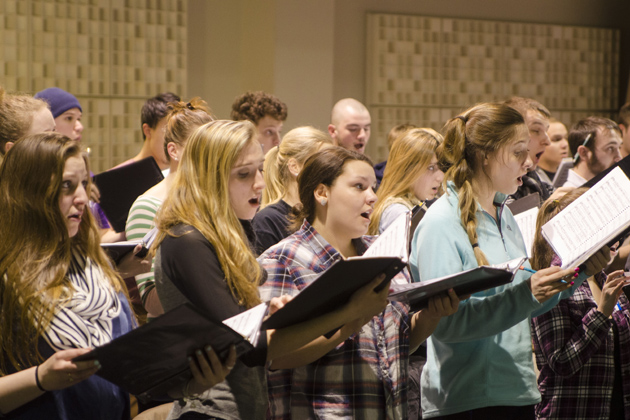
“A Child’s Requiem,” a choral composition by Steven Sametz dedicated to those who lost their lives in the Sandy Hook Elementary School tragedy, premieres this week as the winner of the Raymond and Beverly Sackler Prize in Composition.
Performances will take place at 8 p.m. on Thursday, March 5, at the Jorgensen Center for the Performing Arts in Storrs, and at 8 p.m. on Saturday, March 7, at The Palace Theater in Stamford.
Sametz’s composition won the 2013 Sackler Prize, a biennial international award organized through the UConn School of Fine Arts that supports and promotes composers and performance of their new musical works. “A Child’s Requiem” will feature the combined forces of the UConn Symphony Orchestra, UConn Concert Choir, Chorus Angelicus Children’s Choir of Torrington, and two soloists, soprano Janani Sridhar and tenor Gregory Zavracky. The musicians will perform under the direction of Jamie Spillane ’77 MM, director of choral studies and associate professor of music in the School of Fine Arts.
The competition
The Sackler Music Composition Prize, organized by the UConn School of Fine Arts, is an international award intended to promote innovation, inventiveness, and creative spirit. Three nationally known and respected musicians select the winner. The Sacklers are well-known supporters of the arts and sciences throughout the world and the composition prize is one of the largest given for the composition of new musical works. This year, entries were received from seven nations and 17 states.
The composer
Choral composer Steven Sametz is the 10th Raymond and Beverly Sackler Music Composition winner, receiving a $25,000 award to compose the new work that will be performed and recorded. Sametz is the Ronald J. Ulrich Professor of Music at Lehigh University. He holds degrees from Yale University, the University of Wisconsin-Madison, and the Hochschule für Musik und darstellende Kunst in Frankfurt, Germany. He has received commissions from the National Endowment for the Arts, the Connecticut Council on the Arts, and the Santa Fe music festival.
The composition
“A Child’s Requiem” is a response to the Sandy Hook Elementary killings of December 2012, and dedicated to the children and adults killed in the Newtown tragedy. The 45-minute piece includes lyrics written by children, and will be performed by a children’s chorus, with the consent of their parents. In addition, the performance features adult and child soloists.
Previous winners
Sackler Music Composition winners have included J. Mark Scearce, director of the music department at North Carolina State University; the contemporary composer Nathan Kind Currier, winner of an Academy Award from the American Academy of Arts and Letters; and Sheila Silver, winner of several musical awards including the Rome Prize.
A noted choral composer who is the Ronald J. Ulrich Professor of Music and director of Lehigh University Choral Arts, Sametz grew up in Connecticut not far from Newtown. He says the events of December 2012 resonated with him.
“I’d attended an elementary school similar to Sandy Hook,” he says. “I felt called to write a work that might offer healing to the families and focus attention on one of the most important issues today: How can we keep our children safe in an increasingly violent society?”
In thinking about writing the libretto for the composition, Sametz sought the assistance of school teachers and administrators from around the nation to collect drawings, poetry, and prose that would express children’s responses to loss and tragedy. He received nearly 500 submissions.
“While there was a temptation to edit their words or modify their language, I made the decision early not to change any of the children’s words,” he says. “Their world – their innocence – comes through their texts.”
At 45 minutes in length, “A Child’s Requiem” is a work of complexity for choir, chamber orchestra, children’s choir, and soloists. Spillane has worked with the various choruses and instrumentalists to master what he describes as “challenging music,” both in terms of the notes and the subject matter. In the 10 movements of the work covering nearly 100 pages of music, there are changes in meter, tempo, and sound, including the use of a toy piano.
“Our job is to present the piece as Steven imagined it and created it, and let the audience evaluate the performance,” Spillane says. “The more I dig into it, the more I find wonderful moments. There really is beautiful choral writing, orchestral writing, and colors. It’s powerful. Until you see it as a whole, it’s really hard to evaluate it. I’m excited to put it together as a whole.”
Sametz says he was able to focus on the process of creating the new composition during a three-week residency at the Yaddo Artist Colony in Saratoga Springs, N.Y., where creative artists in various fields work without interruption for a period of between two weeks and two months. Among Yaddo’s previous visiting artists in music composition have been Leonard Bernstein, Aaron Copland, and Michael Tilson-Thomas.
“I surrounded myself with children’s drawings and words on all the walls of my studio,” Sametz says of his time at Yaddo. “In that environment, the libretto came together very quickly.”
He says that the music is modeled on Benjamin Britten’s “War Requiem,” considered the composer’s defining choral work, and also contains echoes of Brahms’ “Ein Deutsches Requiem.” The libretto also includes lines from Ralph Waldo Emerson’s poem “Threnody,” about the death of his son, and the words of the imagist poet H.D., “raging about the violence of our time.”
Sametz spent time in Connecticut last month working with the musicians and choirs who will perform his composition, and says he is looking forward to the performance.
“Jamie Spillane had studied the score thoroughly and really ‘got’ the piece,” Sametz says. “He was very generous in allowing me to speak with the UConn Concert Choir in rehearsal, where I gave a little coaching on the work and they responded beautifully. I have every confidence that they, in concert with the UConn Orchestra and the Chorus Angelicus Children’s Choir under Gabriel Lofvall, will deliver a very powerful and polished performance.”
Both performances of “A Child’s Requiem” by Steven Sametz will be followed by Antonin Dvorak’s “Te Deum” under the direction of Harvey Felder, director of orchestral studies and associate professor of music. Featured soloists will include soprano Constance Rock, associate professor of music and coordinator of vocal studies, and bass-baritone Rod Nelman, assistant professor of voice. For more information on the Storrs performance, go to www.jorgensen.uconn.edu/, and for the Stamford performance go to www.palacestamford.org/.




